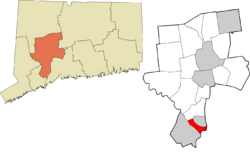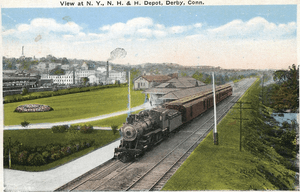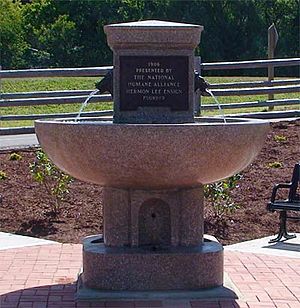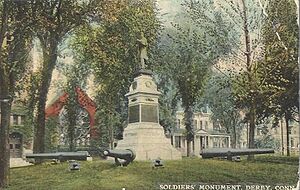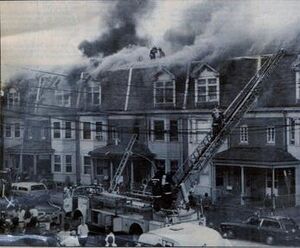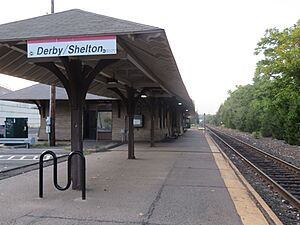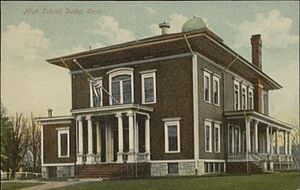Derby, Connecticut facts for kids
Quick facts for kids
Derby, Connecticut
|
|||
|---|---|---|---|
| City of Derby | |||
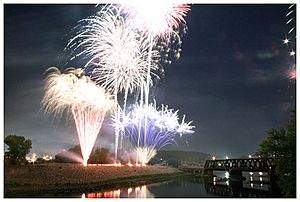
Annual fireworks display from the Derby-Shelton Bridge in 2007
|
|||
|
|||
| Motto(s):
"Connecticut's Smallest City"
|
|||
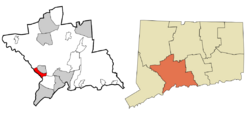 New Haven County and Connecticut New Haven County and Connecticut |
|||
| Country | |||
| State | |||
| County | New Haven | ||
| Region | Naugatuck Valley | ||
| Settled | 1642 | ||
| Named | 1675 | ||
| Incorporated-town | 1775 | ||
| Incorporated-city | 1893 | ||
| Founded by | John Wakeman | ||
| Named for | Derby, England | ||
| Government | |||
| • Type | Mayor-Board of Aldermen | ||
| Area | |||
| • City | 5.41 sq mi (14.00 km2) | ||
| • Land | 5.06 sq mi (13.09 km2) | ||
| • Water | 0.35 sq mi (0.91 km2) | ||
| Highest elevation | 469 ft (142 m) | ||
| Lowest elevation | 3 ft (1 m) | ||
| Population
(2020)
|
|||
| • City | 12,325 | ||
| • Rank | 19th (CT) | ||
| • Density | 2,435.8/sq mi (941.6/km2) | ||
| • Metro | 861,113 (US: 60th) | ||
| • CSA | 23,076,664 (US: 1st) | ||
| Time zone | UTC-5 (Eastern) | ||
| • Summer (DST) | UTC-4 (Eastern) | ||
| ZIP code |
06418
|
||
| Area code(s) | 203/475 | ||
| FIPS code | 09-19480 | ||
| GNIS feature ID | 0206671 | ||
| Major highways | |||
| Commuter rail | |||
Derby is a city in New Haven County, Connecticut, United States. It's about 8 miles (13 km) west-northwest of New Haven. Derby is located where the Housatonic and Naugatuck rivers meet.
It shares borders with Ansonia to the north and Shelton to the southwest. It also borders Orange to the south, Seymour to the northwest, and Woodbridge to the east. Derby is part of the Naugatuck Valley Planning Region. In 2020, its population was 12,325. It is the smallest city in Connecticut by land area, covering about 5.3 square miles (13.7 km²).
Derby was first settled in 1642 as a trading post called Paugasset. It was named after Derby, England, in 1675. The area once included what are now Ansonia, Seymour, Oxford, and parts of Beacon Falls.
Derby was home to the first electric trolley system in New England. It was only the second such system in the United States. It also had the first electric locomotive in U.S. history built and used for hauling freight. This locomotive was built in 1888 and is still kept in working order by the Shore Line Trolley Museum.
Contents
- History of Derby
- Geography and Climate
- People of Derby
- Culture and Fun
- Economy and Businesses
- Education in Derby
- Parks and Recreation
- Landmarks and Monuments
- Notable Events in Derby
- City Infrastructure
- Transportation
- Media and Publishing
- Famous People from Derby
- Sister City
- Future Plans
- Images for kids
- See also
History of Derby
Early Settlements and Naming
Derby was settled in 1642 as an Indian trading post. It was called Paugasset by John Wakeman from New Haven. Fur traders had visited the area before, and Native Americans lived there for centuries. In 1651, the first year-round houses were built. The New Haven Colony recognized Paugasset as a town.
However, residents of Milford protested, so Paugasset went back under Milford's control. In 1675, the state legislature officially made Paugasset the township of Derby. It was named after Derby, England. Derby became an incorporated town on May 13, 1775.
Growth in the 1800s
In 1836, the Colman brothers started the Birmingham Iron Foundry. It was a large factory that employed many people. This was one of many manufacturing businesses that grew in Derby during the 1800s. In 1927, the company joined with Farrel Corporation from nearby Ansonia. It was then called Farrel-Birmingham Corporation. The Derby factory closed in 2000.
In the 19th century, factories in Derby made corsets and hoop skirts. The Kraus Corset Factory is the oldest large factory building from that time. It opened in 1879 and was expanded in 1910. In the 1990s, it was turned into apartments.
In 1872, the Derby Silver Company started making products. In 1898, it became part of the International Silver Company. However, it continued to make silver under its own name until 1933.
Derby in the 1900s
Charlton Comics, a company that published comic books, was based in Derby. It operated from 1944 to 1986.
Towns Formed from Derby
Over time, parts of Derby became separate towns:
- Oxford in 1798
- Seymour in 1850
- Beacon Falls in 1871 (also partly from other towns)
- Ansonia in 1889
Derby Neighborhoods
Derby has several distinct areas:
- Downtown
- West Derby
- Derby Neck
- East Derby
- Hilltop
Geography and Climate
Derby's Location
Derby covers about 5.4 square miles (14 km²). About 5.0 square miles (13 km²) is land, and 0.4 square miles (1 km²) is water. The city is home to Osbornedale State Park, which is 417 acres (1.7 km²) large. The Naugatuck River divides Derby into two main parts: East Derby and Derby Center (Birmingham). The center of Derby is about 66 miles (106 km) from New York City. The lowest point in Derby is 3 feet (1 meter) above sea level. The highest point is 466 feet (142 meters) above sea level.
Derby's Weather
Derby has hot, humid summers and generally mild to cool winters. This type of weather is called a humid subtropical climate. On average, January is the coldest month, and July is the warmest.
| Climate data for Derby, Connecticut | |||||||||||||
|---|---|---|---|---|---|---|---|---|---|---|---|---|---|
| Month | Jan | Feb | Mar | Apr | May | Jun | Jul | Aug | Sep | Oct | Nov | Dec | Year |
| Record high °F (°C) | 65 (18) |
69 (21) |
84 (29) |
93 (34) |
95 (35) |
98 (37) |
104 (40) |
101 (38) |
98 (37) |
90 (32) |
79 (26) |
71 (22) |
104 (40) |
| Mean daily maximum °F (°C) | 35 (2) |
37 (3) |
46 (8) |
57 (14) |
68 (20) |
77 (25) |
83 (28) |
81 (27) |
73 (23) |
62 (17) |
50 (10) |
39 (4) |
59 (15) |
| Mean daily minimum °F (°C) | 17 (−8) |
19 (−7) |
28 (−2) |
37 (3) |
47 (8) |
56 (13) |
62 (17) |
60 (16) |
52 (11) |
41 (5) |
32 (0) |
23 (−5) |
40 (4) |
| Record low °F (°C) | −17 (−27) |
−24 (−31) |
−11 (−24) |
11 (−12) |
26 (−3) |
32 (0) |
38 (3) |
36 (2) |
26 (−3) |
16 (−9) |
1 (−17) |
−18 (−28) |
−24 (−31) |
| Average precipitation inches (mm) | 4.59 (117) |
3.37 (86) |
4.65 (118) |
4.63 (118) |
4.70 (119) |
4.44 (113) |
4.28 (109) |
4.50 (114) |
4.66 (118) |
4.54 (115) |
4.47 (114) |
4.03 (102) |
52.86 (1,343) |
| Average snowfall inches (cm) | 7.9 (20) |
7.8 (20) |
5.0 (13) |
1.1 (2.8) |
0 (0) |
0 (0) |
0 (0) |
0 (0) |
0 (0) |
0 (0) |
0 (0) |
0.7 (1.8) |
5.6 (14) |
| Source 1: Weather Channel | |||||||||||||
| Source 2: Intellicast | |||||||||||||
People of Derby
| Historical population | |||
|---|---|---|---|
| Census | Pop. | %± | |
| 1790 | 2,994 | — | |
| 1800 | 1,878 | −37.3% | |
| 1810 | 2,051 | 9.2% | |
| 1820 | 2,088 | 1.8% | |
| 1830 | 2,253 | 7.9% | |
| 1840 | 2,851 | 26.5% | |
| 1850 | 3,824 | 34.1% | |
| 1860 | 5,443 | 42.3% | |
| 1870 | 8,020 | 47.3% | |
| 1880 | 11,650 | 45.3% | |
| 1890 | 5,969 | −48.8% | |
| 1900 | 7,930 | 32.9% | |
| 1910 | 8,991 | 13.4% | |
| 1920 | 11,238 | 25.0% | |
| 1930 | 10,788 | −4.0% | |
| 1940 | 10,287 | −4.6% | |
| 1950 | 10,259 | −0.3% | |
| 1960 | 12,132 | 18.3% | |
| 1970 | 12,599 | 3.8% | |
| 1980 | 12,346 | −2.0% | |
| 1990 | 12,199 | −1.2% | |
| 2000 | 12,391 | 1.6% | |
| 2010 | 12,902 | 4.1% | |
| 2020 | 12,325 | −4.5% | |
| U.S. Decennial Census | |||
In 2010, there were 12,902 people living in Derby. There were 5,388 households and 3,241 families. The city had about 2,563 people per square mile.
About 82% of the people were White, 7% Black or African American, and 2.6% Asian. About 14.2% of the population identified as Hispanic or Latino.
About 23% of the population was under 19 years old. The average age was 40 years. The average income for a household was $32,438.
Polish and Italian Heritage
Many Polish immigrants have made Derby their home. About 18% of residents say they have Polish heritage. There are several Polish shops, restaurants, and clubs in the city. Saint Michael's the Archangel Parish, a Roman Catholic church, offers services in Polish and English.
A high number of Derby residents also have Italian ancestry. About 27.3% of people in Derby claim Italian heritage. This makes it one of the top cities in Connecticut for Italian-American population.
Culture and Fun
Yearly Events
Derby hosts many fun events throughout the year:
- Derby Day
- Concert on the Green
- Derby Green Farmers' Market
- Derby/Shelton Memorial Day Parade
- Head of the Housatonic Regatta
- Valley New Year
- Derby/Shelton Fourth of July fireworks
- Easter Egg Hunt
- Summerfest on the Green
Museums to Visit
You can learn about history at these museums:
- Osborne Homestead Museum
- General David Humphreys House Museum, which is the Derby Historical Society headquarters (located in Ansonia)
Food and Places to Eat
Derby has many places to eat, from fast food to sit-down restaurants. The Dew Drop Inn is famous for its chicken wings. Archie Moore's Bar & Restaurant is known for its nachos. Zuppardi's Apizza, a popular New Haven-style pizza place, has a location here.
BADSONS Beer Company, a craft brewery, opened in 2017. Its name is an acronym for nearby towns: Beacon Falls, Ansonia, Derby, Seymour, Oxford, Naugatuck, and Shelton.
Economy and Businesses
Local Businesses
Derby is home to several notable businesses:
- Aqua Vim (future) – an aquarium maker moving to Derby.
- Charlton Comics (1944–1986) – a comic book company once based here.
- Curved Glass Distributors (1970–present) – a glass manufacturer.
- Derby Silver Company (1872–1933) – an international silver company.
- Griffin Hospital (1909–present) – a community hospital and Derby's largest employer.
- THC – The Hops Company (2015–present) – voted Connecticut's best Beer Garden and Beer Bar.
New Projects and Developments
Derby has several projects to improve the city:
Factory Street Square
A new project called Factory Street Square is planned for downtown Derby. It will include 400 new homes and shops. The buildings will be four stories high with stores and restaurants on the first floor and apartments above. This project aims to attract young adults and older adults whose children have grown up. It will offer special features like a health club, indoor golf, a rooftop garden, and pet services. The location is close to train and bus lines, making it easy to get around.
Main Street Improvements
Since 2003, the city has been working to widen Main Street (Connecticut Route 34). The goal is to make it a four-lane road with a median. New development projects are being planned for the cleared areas.
Shopping Center Updates
The Pershing Square Shopping Center was built after a bowling alley was taken down in 2014. It is a modern shopping area. The Red Raider Plaza also received major renovations and parking improvements.
Education in Derby
Derby has five public schools and one private school. In the 2017–2018 school year, 1,386 students were in public schools and 159 in private school. In total, 1,545 students were enrolled.
| School name | Grades | Address | Type | Neighborhood |
|---|---|---|---|---|
| St. Mary-St. Michael School | Pre-K–8 | 14 Seymour Avenue | Private Catholic | West Derby (Downtown) |
| Little Raiders University | Pre-K | 75 Chatfield Street | Public | West Derby (Downtown) |
| Bradley Elementary School | K–5 | 155 David Humphrey Road | Public | East Derby |
| Irving School | K–5 | 9 Garden Place | Public | West Derby (Downtown) |
| Derby Middle School | 6–8 | 73 Chatfield Street | Public | West Derby (Downtown) |
| Derby High School | 9–12 | 75 Chatfield Street | Public | West Derby (Downtown) |
In 2018, a building was turned into dormitories for international high school students. It can house 110 students and 10-12 staff members.
Parks and Recreation
Derby Greenway
The Derby Greenway is a 2.05-mile (3.3 km) long trail. It is located on the west side of Derby along the Naugatuck and Housatonic Rivers. This trail is part of the larger Naugatuck River Greenway Trail System. The Derby section of the Greenway is very popular, with over 300,000 visits in 2017.
Osbornedale State Park
Osbornedale State Park is a large park covering 417 acres (1.7 km²). It is located in Derby and partly in Ansonia. The park was given to the state in 1951 by Frances Osborne Kellogg, an industrialist and dairy farmer. The park includes the Osbornedale Homestead, the Kellogg Environmental Center, Pickett's Pond, and many hiking trails. You can enjoy field sports, hiking, ice skating, museum tours, picnicking, and pond fishing. There is no fee to enter, and the park is open from sunrise to sunset.
PFC Frank P. Witek Memorial Park
The Frank P. Witek Memorial Park is a 144-acre (0.58 km²) park on the east side of the city. It is named after Medal of Honor recipient Frank P. Witek, who was born in Derby. The park used to be a reservoir for the city's water supply. The city bought the land in 1997. It has two ponds, hiking trails, and two soccer fields.
Landmarks and Monuments
Historic Places on the National Register
Several places in Derby are listed on the National Register of Historic Places:
- Birmingham Green Historic District – This area includes 10 buildings, three churches, and four monuments. It shows good examples of 19th-century town planning.
- John I. Howe House – Built in 1845 for John Ireland Howe, a pioneer in pin manufacturing.
- Kraus Corset Factory – A historic factory that made corsets, now apartments.
- Osborne Homestead – A historic 19th-century farmhouse that is now a museum.
- Sterling Opera House – Many famous performers like Amelia Earhart and Harry Houdini appeared here. It was the first building in Connecticut added to the National Register in 1968.
- Harcourt Wood Memorial Library – Built in 1902 with Ansonia marble.
Other Important Landmarks
National Humane Alliance Fountain
Derby has brought back its National Humane Alliance fountain. This granite fountain is over 100 years old and has lion-head spigots. It was given to the city in 1906. The fountain has three levels: one for humans, a large bowl for horses, and smaller bowls for dogs and cats. It was restored and moved to a new plaza in 2006.
Civil War Monument
In 1875, people in Derby raised money for a statue to honor soldiers from Derby and Huntington (now Shelton) who fought in the Civil War. The monument was dedicated on July 4, 1883. It is 21 feet 4 inches (6.5 meters) tall and features a 7-foot (2.1 meters) bronze statue. The monument was restored in 2018.
Old Derby Uptown Burial Ground
This cemetery is one of the first public burial grounds in the country not connected to a church. The first known burial was in 1687. The cemetery is open to the public.
Notable Events in Derby
River Restaurant Explosion (1985)
On December 6, 1985, a three-story building on Main Street collapsed after a natural gas explosion. Six people died, and many were injured. Natural gas had leaked into the sewer line from nearby construction. This event led to Connecticut's "Call Before You Dig" program, which helps prevent similar accidents.
Caroline Street Fire (1991)
On August 12, 1991, a fire started in the basement of a three-story home on Caroline Street. Firefighters from Derby and nearby towns responded. Eighteen people escaped or were rescued. Sadly, a mother and her two children died in the fire. Investigators determined the fire was accidental.
The Great Flood of 1955
In August 1955, two hurricanes, Connie and Diane, brought heavy rain to the area. The ground was already soaked, so the Housatonic and Naugatuck Rivers overflowed their banks. This caused major flooding in the Naugatuck River Valley areas, including Derby. The Naugatuck River reached its highest recorded flood level ever. The flood killed 87 people and caused an estimated $200 million in damage (about $1.8 billion in 2018 money).
City Infrastructure
Green Energy Efforts
Derby is working on using more clean energy:
Solar Power
In 2015, Derby started a project to install almost 3,000 solar panels on its old landfill. These panels generate about 840 megawatts of power each year. This helps power city buildings and is expected to save the city money on energy costs for 20 years.
Hydrogen Fuel Cell Energy
In 2018, Derby was chosen to be home to a new hydrogen fuel cell plant. This plant will generate 14.8 megawatts of power. Construction was expected to begin in 2019.
Singer Village Zero Energy Homes
The Singer Estate, once a large property, is now home to Connecticut's first zero-energy subdivision. Seven homes were built here that are designed to produce as much energy as they use. In 2016, this development won awards for being the "Best Green Energy Single Family Development" and "Best Green Energy Efficient Home."
City Services
Electricity in Derby is provided by The United Illuminating Company. Gas service comes from Eversource Energy. Water is supplied by the South Central Connecticut Regional Water Authority. The city also manages wastewater services.
Transportation
Train Travel
Derby has a Metro-North Railroad station called Derby–Shelton. It is located at 1 Main Street and serves both Derby and Shelton residents. This station is the last regular stop on the Waterbury Branch line before it connects to the main rail line. It takes about 1 hour and 54 minutes to reach Grand Central Terminal in New York City. Travel to New Haven takes about 1 hour and 2 minutes.
Bus Services
All bus routes in Derby meet at the Derby–Shelton station.
- Connecticut Transit – Route 255
- Greater Bridgeport Transit Authority – Routes 15 & 23
- Valley Transit – A local bus service that requires reservations. It serves Ansonia, Derby, Shelton, and Seymour.
Airports Nearby
Local Airports
- Waterbury–Oxford Airport (13 miles / 21 km away)
- Sikorsky Memorial Airport (14 miles / 23 km away)
Regional Airports
- Tweed New Haven Airport (15 miles / 24 km away)
- Westchester County Airport (41 miles / 66 km away)
International Airports
- Bradley International Airport (58 miles / 93 km away)
- LaGuardia Airport (66 miles / 106 km away)
- John F. Kennedy International Airport (73 miles / 117 km away)
Media and Publishing
Current News Sources
You can find news about Derby in:
- The New Haven Register
- The Connecticut Post
- The Valley Gazette
- The Valley Independent Sentinel, an online-only news site.
Historical Publishers
Derby was once home to Charlton Press, Inc. This company was unique because it did all parts of publishing, from writing to printing and distributing, in one building. It was best known for its Charlton Comics division, which produced many comic books from 1946 to 1985.
Another company, Bruce-Royal Publishing Corporation, was also in Derby. It published magazines.
Famous People from Derby
- Samuel George Andrews (1796–1863), a U.S. congressman from New York.
- Ebenezer Don Carlos Bassett (1833–1908), the first black American diplomat.
- Charles T. Beardsley, Jr. (1861–1937), a famous architect.
- David Raymond Curtiss (1878–1953), a mathematician.
- Brian Dennehy, a film actor who lived in Derby as a child.
- Steve Ditko, co-creator of the Spider-Man comic hero.
- William Frederick Durand (1859–1958), a leader in aviation research.
- Danielle Ferland (born 1971), a Broadway and film actor.
- Philip M. Halpern (born 1956), a nominee for a U.S. federal judge position.
- Josiah Holbrook (1788–1854), founder of the lyceum movement.
- Isaac Hull (1773–1843), a commodore in the U.S. Navy.
- William Hull (1753–1825), a general in the American Revolutionary War.
- David Humphreys, a Revolutionary War soldier and public official.
- Orson Hyde (1805–1878), a leader in the Latter Day Saint movement.
- Frances Osborne Kellogg (1876–1956), an industrialist whose estate became a museum and state park.
- Themis Klarides (born 1965), a political leader in Connecticut.
- Ben Kopec (born 1981), a musician and composer.
- Andy Natowich (1918–2014), an NFL running back.
- Patrick B. O'Sullivan (1887–1978), a U.S. congressman and judge.
- Samantha Bowers (born 1994), a singer-songwriter.
- Michele Ragussis (born 1969), a chef who appeared on TV.
- Alan Schlesinger, a former Derby mayor.
- Bob Skoronski, an NFL player who won Super Bowls with the Green Bay Packers.
- Sheldon Thompson, a former mayor of Buffalo, New York.
- Joseph "Fighting Joe" Wheeler, a Confederate general and politician.
- Elizabeth Ann Whitney (1800–1882), an early Latter-day Saint leader.
- Stephen Whitney (1776–1860), a wealthy merchant.
- Kathleen M. Williams (born 1956), a U.S. Federal Judge.
- Frank P. Witek (1921–1944), a Medal of Honor recipient.
- Edward Wooster (1622–1689), considered the first permanent settler in Derby.
Sister City
- Puglianello, Italy
Future Plans
The Howe House is planned to become the Lower Naugatuck Valley Industrial Heritage Center. It will display many historical items from the Industrial Era. Future programs will allow students to learn about the Industrial Revolution and the Valley's role in it.
Images for kids
See also
 In Spanish: Derby (Connecticut) para niños
In Spanish: Derby (Connecticut) para niños




